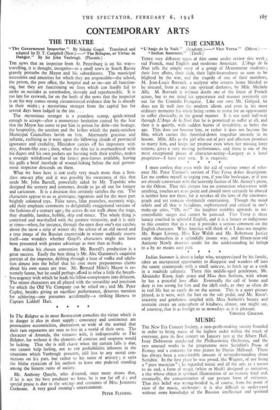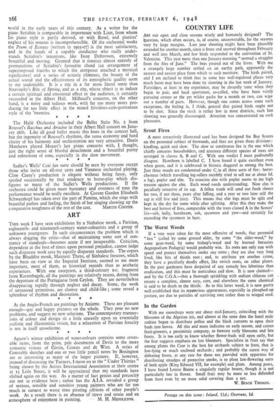MUSIC
THE New Era Concert Society, a non-profit-making society founded in order to bring music of the highest order within the reach of everyone, gave its first concert on January 31st at the Albert Hall. Issay Dobrowen conducted the Philharmonic Orchestra, and the two unusual works in the programme were Scriabin's Poem of Ecstasy and a concerto for two pianos by Darius Milhaud. There has always been a considerable amount of misunderstanding about Scriabin. In the first place he was proud, like Wagner, of not being a -!` pure musician"; he regarded music and all the arts as a means to an end, a form of magic (white or black) designed as initiation, a rite whose object is spiritual illumination of an esoteric kind and, eventually, the consummation of our present form of existence. That this belief was wrong-headed is, of course, from the point of view of the music, irrelevant : it is also difficult to understand without some knowledge of the Russian intellectual and spiritual world in the early years of this century. As a writer for the piano Scriabin is comparable in importance-with Liszt, from whom his piano style is partly derived, or with Ravel, and pianists' neglect of his sonatas is incomprehensible. Of the orchestral works the Poem of Ecstasy (written in 1905-07) is the most satisfactory, and in the hands of a capable conductor who really under- stands Scriabin's intentions, like Issay Dobrowen, extremely beautiful. and moving. Granted that it consists almost entirely of permutations of Scriabin's favourite chord (an arrangement of superimposed fourths to which the composer attached a mystical significance) and a series of ecstatic climaxes, the beauty of the actual sound and the effectiveness of its atmospheric quality seem to me undeniable. It is a rite in a far more literal sense than Stravinsky's Rite of Spring, and as a rite, whose object is to induce a certain spiritual and emotional effect in the audience, it certainly succeeded at the Albert Hall. Milhaud's concerto, on the other hand, is a noisy and tedious work, with far too many notes pro- ducing far too little effect in the mixed frivolous-cum-portentous style of the 'twenties.
* * .* * The Halle Orchestra included the Ballet Suite No. 2 from Roussel's Bacchus and Ariadne in their Albert Hall concert on Janu- ary 28th. Like all good ballet music this loses in the concert hall, but the ingenuity of Roussel's rhythms, the tense economy and hard clarity of his harmony and orchestration are very attractive. Denis Matthews played Mozart's last piano concerto with, I thought, just the right sense of blissful detachment and a beautiful purity and refinement of tone, especially in the slow movement. • * * * Sadler's Wells' Cosi fan tutte should be seen by everyone except those who insist on all-star casts and Viennese orchestral playing. Clive Carey's production is elegant without being fussy, only spoiled occasionally by that tendency to horse-play which dis- figures so many of the Sadler's Wells productions. If the orchestra could be given more buoyancy and evenness of tone the performance would be really excellent. At Covent Garden Elizabeth Schwarzkopf has taken over the part of Pamina, which she sings with beautiful pathos and feeling, the finish of her singing showing up the
comparative roughness of the rest of the cast. MARTIN COOPER.































 Previous page
Previous page